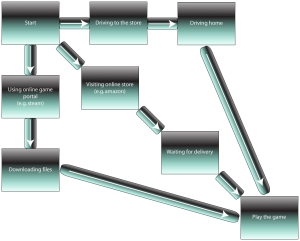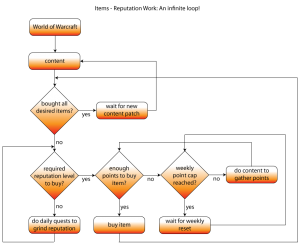Real-world gaming flow
During my ongoing literature review I often discover interesting facts about things I’ve never thought about. Sometimes I can connect these facts with my own observations: The result is mostly a completely new idea why things are as they are. Maybe these ideas are new to you, too. Therefore I’ll share my new science based knowledge with you!
This week: I read the book „What video games have to teach us about learning and literacy“ [1]. James Paul Gee compares the ways we’re learning while we’re playing video games with the ways school teaching us math and science. Finally he points out 36 learning principles provided by video games.
This „finding of the week“ offers some critical thoughts about the use of gamification to create situations in which flow can happen.
In his book, Gee mentions flow [4] as one of the key concepts to keep computer game players engaged and challenged. McGonigal [2] transfers the video game approach of flow into the real-world and points out the advantage of it in making the real-world more engaging. This is what gamification [3] tries to achieve by adding game elements to non-gaming environments.
According to Csikszentmihalyi [4], a potential of flow can be added to daily-life tasks by restructuring them. This can be done by adding new (personal) goals to achieve while performing a particular task.
Adding new goals is a good way to keep focused on a task. Economic driving is a common aim – especially under the aspect of today’s gas prices. However focusing on economic driving – instead of just having fun – is often a hard task. By adding the goal of reaching new distance records without refueling, economic driving can become a challenge. The driver can focus on the new goal and after achieving a new record, she / he gets a positive feedback by looking at the distance record. The positive feedback and the fact that there’s always the chance of increasing the record can renew this challenge. The driver keeps engaged in economic driving and additionally experiences satisfaction through the positive feedback.
Computer games often provide some achievements as well. The player has to fulfill some additional requirements to earn an achievement. This can be a special constraint to the regular game play: Normally the player has to gather 10 points within a certain amount of time. But if the player likes to earn an achievement, he has to gather 15 points within the same amount of time. Thus the game challenges the player with an additional goal and the task of gathering points becomes more engaging.
However the achievement system is more popular in multiplayer games: Players can compare their earned achievements and compete against each other. The aspect of competition enhances the power of these additional goals in the regular game environment.
Solo games on the other hand can’t provide such a competition. Therefore achievements can become pointless in these games. It’s nice to gather them – they are still providing positive feedback – but without the chance of comparability the achievements might get lost in space because there’s no real measurement.
This is, I think, one of the biggest problems if we try to add new goals to the real-world. Economic driving and reaching new records is fun and as already mentioned it provides positive feedback, but it’s due to the lack of comparability often pointless as well.
As long as additional goals are added to a shared environment, they are engaging through competition – as the gamification concept has already shown.
But how to keep all the personal achievements engaging? Creating a world-wide personal achievement portal, where everyone can post their recently earned achievements? How to compare economic driving among different car types? How to get comparability without having a common platform?
On the other hand, the satisfaction of positive feedback after completing a challenge can still be an awe experience and keep the engagement high. May be the comparability is just overrated.
And finally gamification of my own life means that I’m always on top of the scoreboards!
[1] Gee, James Paul (2007): What video games have to teach us about learning and literacy, New York.
[2] McGonigal, Jane (2011): Reality Is Broken, New York.
[3] Raymer, Rick (2011): Gamification: Using Game Mechanics to Enhance eLearning, retrieved on 2013/4/27.
[4] Csikszentmihalyi, Mihaly (2010): Flow : Das Geheimnis des Glücks, 15. edit., Stuttgart.

